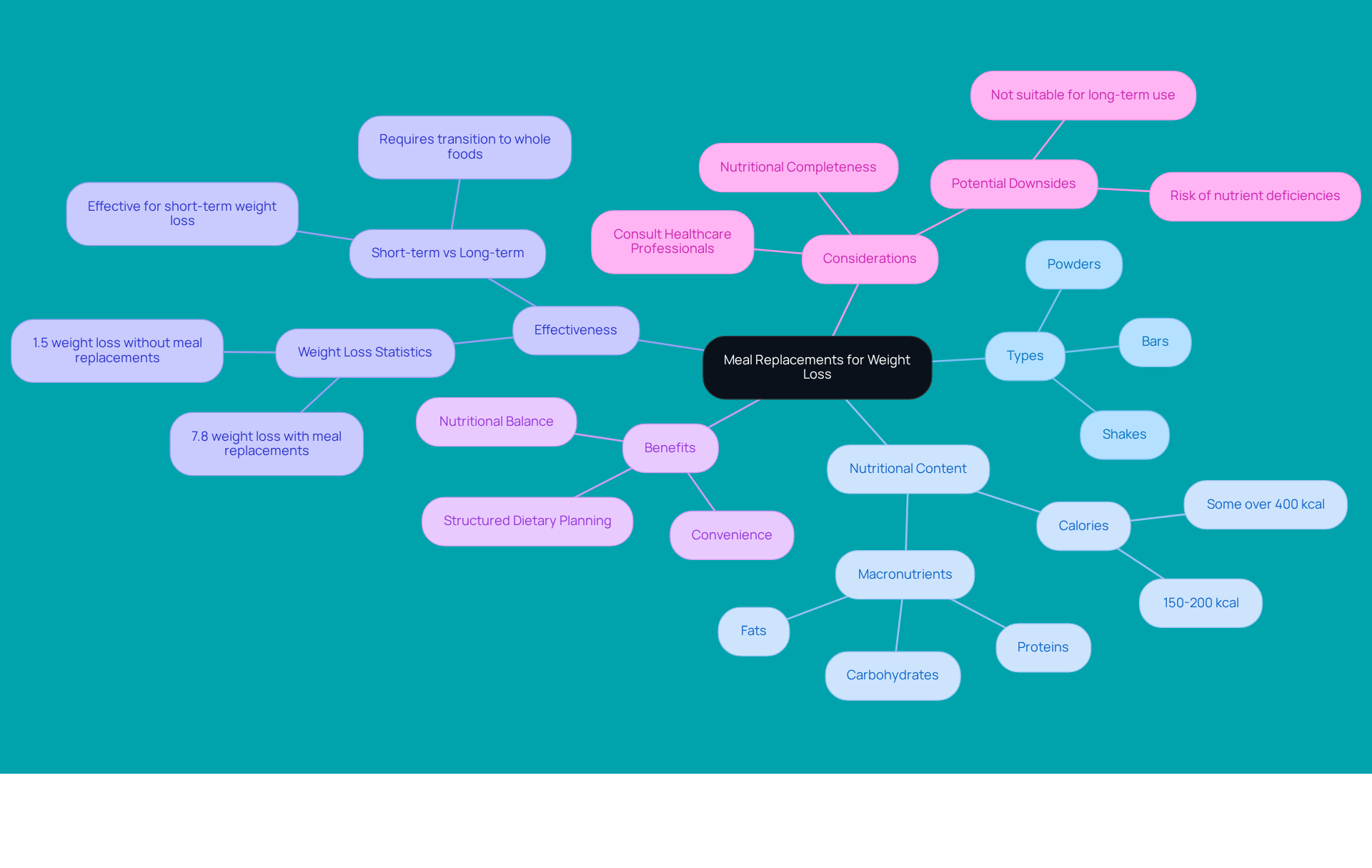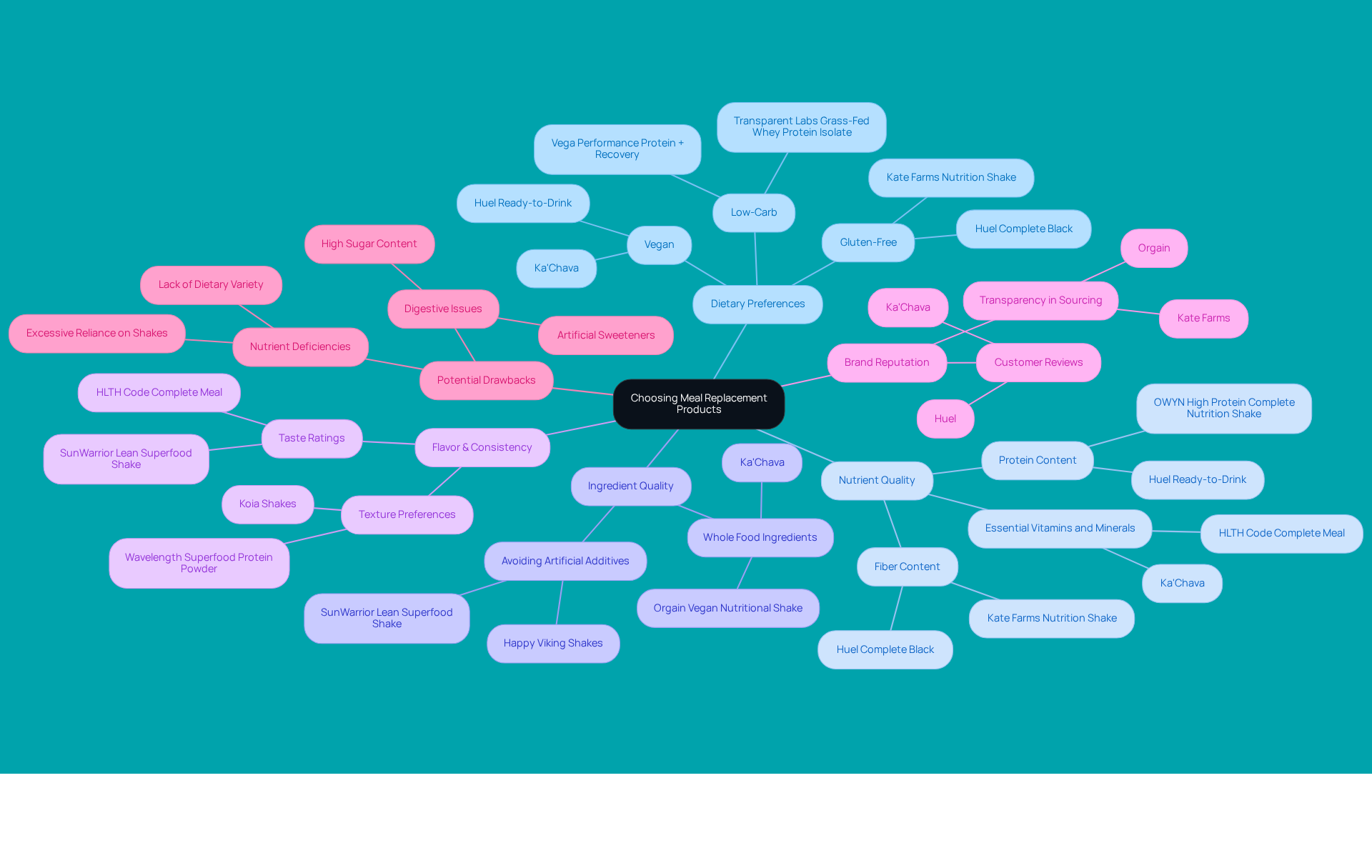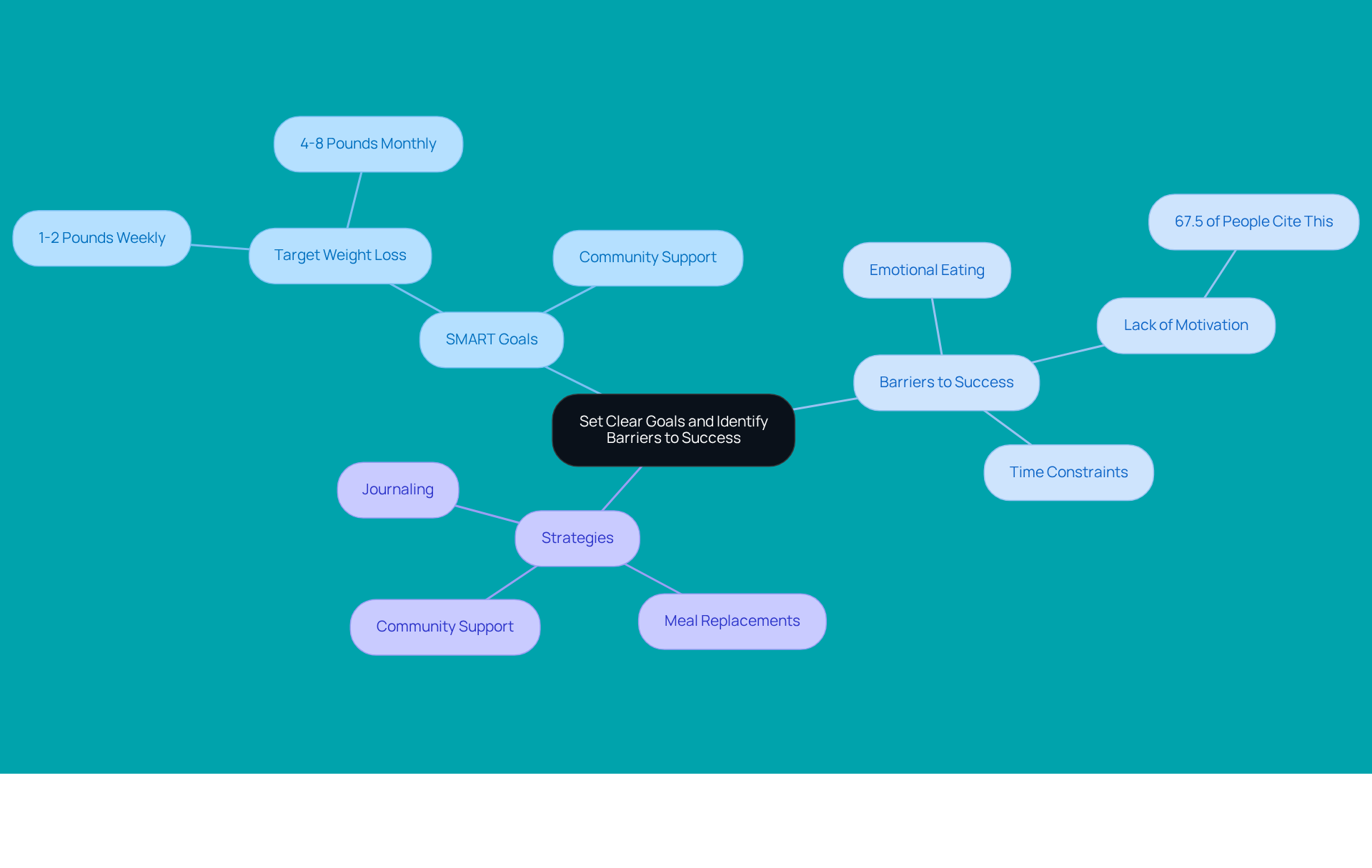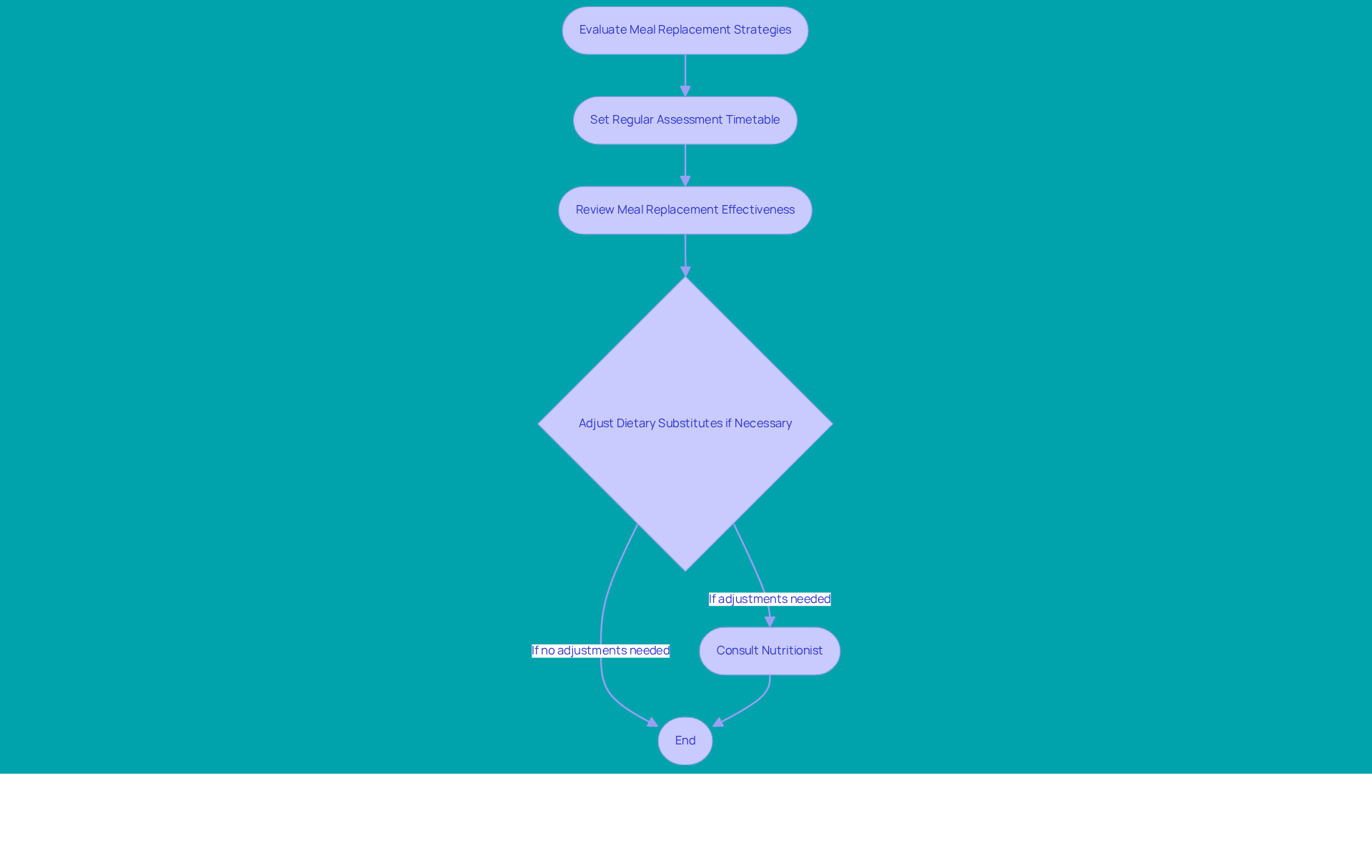Overview
Are you feeling overwhelmed by the weight loss journey? You're not alone. The essential checklist for meal replacement for weight loss success highlights a few key steps that can make a real difference.
- First, it’s crucial to choose nutritionally balanced products. This not only supports your body but also helps you feel satisfied and energized.
- Setting clear goals is another important aspect. Think about what you want to achieve and how meal replacements can simplify your meal planning. They can help you control your calorie intake without the stress of constant meal prep. Imagine if you could enjoy your meals while still making progress towards your goals!
However, it’s essential to remember that meal replacements are just one part of the puzzle.
- Integrating whole foods into your diet is vital for long-term success.
- Consulting with health professionals can provide you with personalized guidance, ensuring that your approach to weight loss is sustainable and healthy.
So, take a moment to reflect: How can you incorporate these strategies into your routine? Together, we can navigate this journey towards effective weight management. You’ve got this!
Introduction
Meal replacements have become a go-to option for many individuals looking to manage their weight effectively. They offer a convenient and balanced nutritional solution in the form of shakes, bars, or powders. If you’re feeling overwhelmed by the choices out there, you’re not alone. This article is here to guide you through the world of meal replacements, highlighting their role in weight loss and the key factors to consider when selecting the right products for your needs.
Imagine if you could simplify your weight loss journey while ensuring you’re getting the nutrients your body craves. With so many options available, it’s easy to feel lost or even discouraged. How can you be sure you’re making the best choices for your health and your goals? Let’s explore this together, so you can feel empowered and confident in your decisions.
Understand Meal Replacements and Their Role in Weight Loss
Meal replacements for weight loss can be a convenient and nutritionally balanced option for those of us looking to manage our weight effectively. Typically available as shakes, bars, or powders, these products function as a meal replacement for weight loss, aiming to replace one or two meals a day while ensuring we still get the nutrients we need. Understanding their nutritional content is crucial; most meal substitutes contain around 150 to 200 calories, with some going over 400. They’re designed to provide essential macronutrients—proteins, fats, and carbohydrates—along with the vitamins and minerals necessary for our overall health.
You might be wondering how effective these substitutes really are. Studies show that high-protein meal replacement for weight loss can help us feel fuller and support muscle maintenance. For instance, research indicates that individuals who utilized a meal replacement for weight loss by replacing two meals a day with these alternatives lost an average of 7.8% of their body weight over three months, compared to just 1.5% for those sticking to a traditional low-calorie diet.
While meal substitutes offer several benefits, like convenience and structured dietary planning, it’s important to be aware of potential downsides. Choosing products that are nutritionally complete and free from added sugars or unnecessary fillers is essential. If you have existing health issues or dietary restrictions, it’s wise to consider these factors when selecting meal substitutes. Consulting with a healthcare professional or a Registered Dietitian Nutritionist (RDN) can help tailor food options to your personal health needs and dietary preferences.
Integrating meal substitutes into a balanced diet requires thoughtful consideration of broader lifestyle changes. They shouldn’t be seen as a long-term fix but rather as a stepping stone toward healthier eating habits. It’s vital to return to whole foods after a period of using substitutes for sustainable weight management. Ultimately, the effectiveness of a meal replacement for weight loss lies in its ability to simplify our dining choices, support calorie control, and provide essential nutrients, making it a valuable ally in our journey toward a healthier body.

Choose the Right Meal Replacement Products
Identifying your dietary preferences—whether vegan, gluten-free, or low-carb—can really help streamline your choices. For example, if you’re leaning towards a plant-based diet, options like Huel Ready-to-Drink and Koia shakes are great picks. On the other hand, if gluten is a concern, Kate Farms Nutrition Shake ensures safety for those with sensitivities.
It’s also important to ensure that your dietary substitutes are rich in essential nutrients. Look for products that pack a punch, like HLTH Code Complete Meal, which provides 27 essential vitamins and minerals. Huel Complete Black offers 8 grams of fiber per serving, supporting your digestive health. And if you’re after plant-based protein, the Ka’Chava shake delivers 25 grams along with 50% of your daily magnesium intake—making it a strong contender for comprehensive nutrition.
When choosing products, take a moment to scrutinize the labels. Assessing ingredient quality is key, so steer clear of artificial additives. Opt for brands that prioritize whole food ingredients, like Orgain Vegan Nutritional Shake, which is USDA Organic and free from common allergens.
Don’t forget to consider the flavor and consistency of your dietary substitutes. After all, enjoying what you consume can significantly improve your compliance with your weight loss strategy. Products like SunWarrior Lean Superfood Shake are often praised for their subtle flavor, making them a pleasure to include in your daily routine.
Choosing reputable brands is crucial. Look for those with positive customer reviews and transparent sourcing practices. Brands like Ka'Chava and Huel are recognized for their commitment to quality and customer satisfaction, ensuring you make informed choices on your health journey.
However, it’s essential to be aware of the potential drawbacks of relying too heavily on dietary shakes. Excessive dependence may lead to nutrient deficiencies or digestive issues. Experts like Christina Snyder emphasize that meal replacement for weight loss shakes should complement, not replace, real food in your diet.
So, as you navigate your wellness journey, remember to incorporate whole foods alongside your dietary substitutes. Together, we can make choices that support our health and well-being.

Set Clear Goals and Identify Barriers to Success
Setting clear, SMART (Specific, Measurable, Achievable, Relevant, Time-bound) objectives is crucial for your journey toward a healthier lifestyle. Imagine if you could lose 1-2 pounds each week—this aligns with the CDC's recommendation and translates to a monthly goal of 4-8 pounds. It’s a realistic target that many health organizations support. However, you might be wondering why so many struggle to stick to their weight loss plans. Studies show that 67.5% of people cite a lack of motivation as a significant barrier. This highlights just how important community support and accountability can be.
Identifying personal barriers, like emotional eating or time constraints, is essential for making progress. To tackle these challenges, consider strategies such as:
- Incorporating a meal replacement for weight loss. This not only saves time but also reduces the temptation of unhealthy choices by providing a meal replacement for weight loss.
- Engaging with supportive friends or communities can provide that extra boost of motivation and accountability you need.
- Keeping a journal to document your goals, emotions, and progress can enhance your self-awareness and help you stay on track.
Furthermore, the NHLBI indicates that individuals who set objectives lost, on average, 65% more pounds over a year compared to those who didn’t establish any goals. Regularly reassessing your goals based on your experiences and outcomes is vital. For instance, if a specific target feels overwhelming, don’t hesitate to adjust it to something more manageable. This adaptability can prevent feelings of frustration and encourage a sustainable approach to shedding pounds.
Together, let’s embrace this journey. Remember, you’re not alone in this. With the right support and strategies, you can achieve your goals and lead a healthier life.

Evaluate Progress and Adjust Meal Replacement Strategies
- Setting a regular timetable for assessing your progress in reducing body mass and improving your overall health can be incredibly beneficial. Consider doing this weekly or bi-weekly to stay on track.
Have you considered how meal replacement for weight loss fits into your daily habits? Evaluating the effectiveness of a meal replacement for weight loss can significantly aid you in reaching your weight loss goals. Studies show that individuals using a meal replacement for weight loss can shed an average of 7.8% of their body mass after three months—much more than those on traditional diets.
- It’s important to be adaptable. If you’re not seeing the results you hoped for, don’t hesitate to adjust your dietary substitutes or approaches. Nutritionists suggest that altering the frequency and ratio of meal replacement for weight loss can enhance fat loss results. Research indicates that a meal replacement for weight loss, by substituting three meals daily, can lead to a medium effect size on fat loss (Hedges' g = 0.544).
Consulting with a nutritionist or wellness coach can provide you with tailored advice and adjustments to your meal replacement for weight loss plan. Their expertise can help you navigate challenges and optimize your approach. As experts note, organized management programs for body mass can offer significant advantages at minimal cost to health care providers.
- Remember to celebrate small victories along the way! Recognizing your progress, no matter how minor, can significantly boost your motivation and reinforce positive behaviors. You’re not alone on this journey; together, we can make meaningful strides toward your wellness goals.

Conclusion
Meal replacements can be a practical ally for those of us striving to reach our weight loss goals while keeping our nutrition in check. By swapping out one or two meals a day with these products, managing calorie intake and ensuring we get essential nutrients becomes much simpler. It’s important to understand how to weave meal replacements into a broader wellness strategy for lasting success.
Choosing the right meal replacement products tailored to your unique dietary needs—like vegan or gluten-free options—can make a significant difference. Think about the nutrient-rich ingredients that fuel your body and the importance of setting clear, achievable weight loss goals. Have you considered how evaluating your progress and adjusting your strategies can optimize your results? Remember to celebrate those small victories along the way; they matter!
Ultimately, meal replacements can be a valuable tool on your journey toward healthier eating habits and effective weight management. By combining these products with whole foods, supportive communities, and personalized strategies, you can overcome common barriers to success. Together, we can foster sustainable lifestyle changes. Imagine embracing this holistic approach and witnessing meaningful progress toward a healthier future. Are you ready to take that next step?
Frequently Asked Questions
What are meal replacements and how do they aid in weight loss?
Meal replacements are convenient and nutritionally balanced options available as shakes, bars, or powders that replace one or two meals a day while providing essential nutrients to help manage weight effectively.
What is the typical calorie content of meal replacements?
Most meal replacements contain around 150 to 200 calories, with some products exceeding 400 calories.
What macronutrients do meal replacements provide?
Meal replacements are designed to provide essential macronutrients, including proteins, fats, and carbohydrates, along with necessary vitamins and minerals for overall health.
How effective are meal replacements for weight loss?
Studies show that high-protein meal replacements can help individuals feel fuller and support muscle maintenance. For example, those replacing two meals a day with meal replacements lost an average of 7.8% of their body weight over three months, compared to just 1.5% for those on a traditional low-calorie diet.
What are the benefits of using meal replacements?
Meal replacements offer benefits such as convenience, structured dietary planning, and the ability to simplify dining choices while supporting calorie control and nutrient intake.
Are there any downsides to using meal replacements?
Potential downsides include the need to choose nutritionally complete products that are free from added sugars or unnecessary fillers. It is also important to consider any existing health issues or dietary restrictions.
Should I consult a professional before using meal replacements?
Yes, consulting with a healthcare professional or a Registered Dietitian Nutritionist (RDN) can help tailor food options to your personal health needs and dietary preferences.
How should meal replacements be integrated into a diet?
Meal replacements should be used thoughtfully as part of a balanced diet and not as a long-term solution. It's important to return to whole foods after a period of using substitutes for sustainable weight management.
What is the overall role of meal replacements in a weight loss journey?
The effectiveness of meal replacements lies in their ability to simplify dining choices, support calorie control, and provide essential nutrients, making them a valuable ally in achieving a healthier body.




